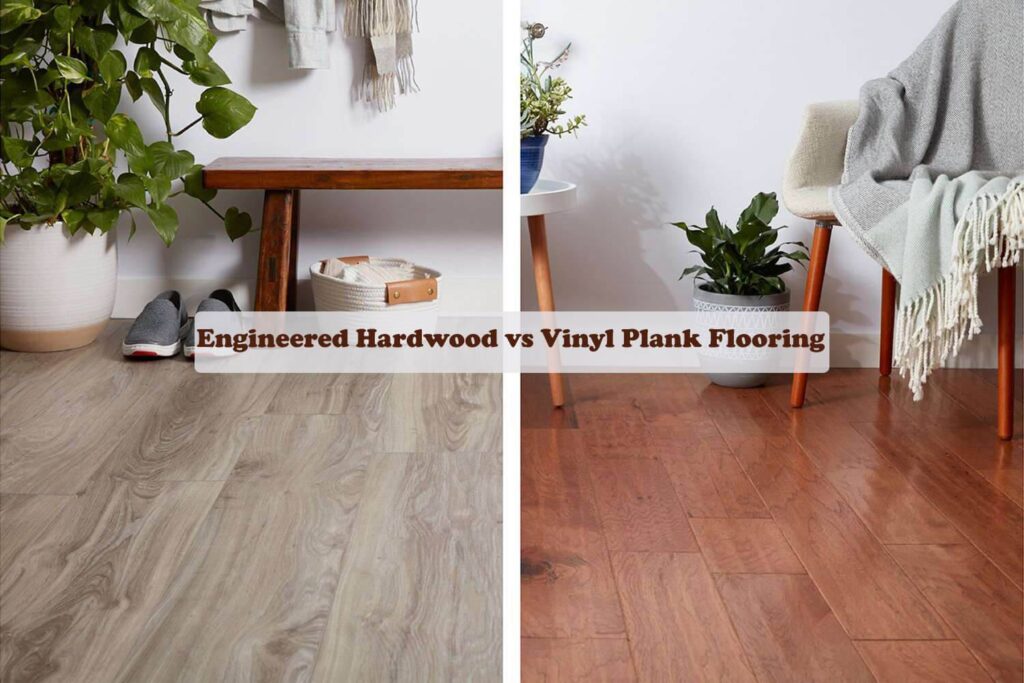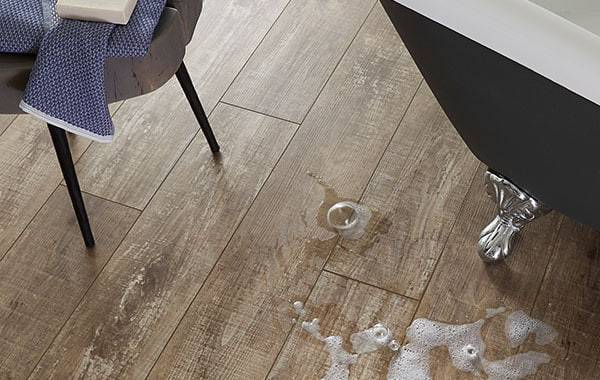In the quest for the perfect floor, two contenders have emerged as popular picks for budget-minded homeowners: engineered hardwood and vinyl plank. Both options cleverly replicate the timeless look of real hardwood at a more affordable price.
But with each boasting unique strengths, deciding which reigns supreme for your home can be tricky. To simplify your search, we’ll delve into a head-to-head comparison of vinyl plank and engineered hardwood across five key categories.
Discover your dream floor: Shop Dex Flooring today!
Engineered Hardwood vs Vinyl Plank Flooring: Water Resistance
When it comes to withstanding moisture, engineered hardwood and vinyl plank flooring take vastly different approaches. Engineered hardwood was created to improve upon the moisture sensitivity of solid hardwood.
Its plywood core offers some defense against light spills or occasional splashes, but anything more substantial can cause warping and damage. Imagine a spilled cup of water – while engineered hardwood might hold up for a short while, prolonged exposure would be detrimental.
Vinyl plank flooring, on the other hand, is a champion of water resistance. In fact, most luxury vinyl plank (LVP) options are 100% waterproof. This makes them ideal for moisture-prone areas like kitchens, bathrooms, laundry rooms, and basements.
Spilled drinks, pet accidents, and even minor leaks won’t faze LVP. Its composition allows for quick cleanup, preventing water from seeping into the subfloor and causing problems. Think of it as an impenetrable shield against the perils of water in your home.
Engineered Hardwood vs Vinyl Plank: Achieving the Perfect Look
Both engineered hardwood and vinyl plank flooring excel at mimicking the timeless beauty of natural wood. Engineered hardwood offers the closest match, boasting a real wood top layer that replicates the grain patterns, textures, and color variations of its solid wood counterpart. Walk on engineered hardwood and you’ll feel the satisfying firmness and hear the subtle creak – a sensory experience that’s hard to distinguish from real solid wood flooring.
Luxury vinyl plank (LVP) takes a different approach. While it may not perfectly capture the nuanced textures of natural wood, LVP has come a long way in replicating realistic wood visuals. Advanced printing technology allows LVP to mimic a wide variety of wood species, from the rich tones of mahogany to the light hues of maple. However, LVP is typically softer underfoot compared to engineered hardwood. This can be a plus for some, particularly in kitchens where standing for long periods is common. The softer texture provides a more comfortable experience, and the slight give can be easier on your joints. Additionally, LVP lacks the characteristic sound of natural wood floors. This can be a benefit for those who prefer a quieter environment.
Ultimately, the choice between engineered hardwood and LVP for appearance comes down to personal preference. Do you prioritize the most authentic wood look and feel, or are you seeking a realistic visual with a softer, more comfortable experience underfoot?
The Low-Maintenance Lifestyle
Engineered hardwood and vinyl plank flooring are both champions of low-maintenance living. Their durable surfaces are built to withstand the everyday wear and tear of busy households.
Engineered hardwood’s top layer is typically finished with a tough, stain-resistant coating. This makes cleaning up spills and messes a breeze. Regular sweeping and occasional mopping with a wood floor cleaner will keep your engineered hardwood floors looking their best. However, it’s important to avoid excessive moisture, as this can damage the wood core.
Luxury vinyl plank (LVP) is equally adept at keeping things clean. Its stain-resistant surface allows for effortless cleanup of spills and dirt. Regular sweeping or vacuuming with the hard floor setting is all that’s typically needed for LVP. For tougher messes, a damp mop works wonders. The waterproof nature of LVP makes it a great choice for areas prone to spills, like kitchens and bathrooms.
Both engineered hardwood and LVP are fantastic options for families with children or pets. Their stain resistance means less worry about permanent marks from dropped food, muddy paw prints, or creative crayon masterpieces. The ease of cleaning allows you to spend less time on maintenance and more time enjoying your beautiful floors.
Engineered Hardwood vs Vinyl Plank: Installation Ease
Both engineered hardwood and vinyl plank flooring offer user-friendly installation processes, making them ideal for DIY enthusiasts or homeowners looking to save on labor costs.
Engineered Hardwood:
Engineered hardwood can be installed using various methods, including:
- Gluing: This method involves applying adhesive to the subfloor before laying down the engineered hardwood planks. It creates a strong, permanent bond and is ideal for high-traffic areas.
- Stapling: In this method, staples are used to secure the engineered hardwood planks to the subfloor. It’s a faster option than gluing but may not be suitable for all subfloor types.
- Floating: Floating installations utilize a click-lock system where planks interlock without needing glue or nails. This is a popular choice for DIYers due to its ease and speed.
Luxury Vinyl Plank (LVP):
Luxury vinyl plank (LVP) also boasts simple installation methods:
- Glue: Similar to engineered hardwood, some LVP planks require gluing down to the subfloor for maximum stability.
- Lock-in: This method is most common for LVP flooring. The planks feature interlocking edges that click together to create a seamless floor. It’s a quick and easy process that doesn’t require any messy adhesives.
Regardless of the chosen method, both engineered hardwood and LVP installations are generally considered easier than solid hardwood flooring. This makes them attractive options for those who want to tackle the project themselves or save on installation costs.
Engineered Hardwood vs. Vinyl Plank: Scratch Resistance
While neither engineered hardwood nor vinyl plank flooring are invincible to scratches, they handle wear and tear in different ways.
Engineered hardwood boasts impressive resilience in daily life. Its top layer, composed of real wood, is generally hard-wearing and can withstand minor scuffs and scratches that come with everyday use. However, it’s not entirely invincible. Heavy furniture or sharp objects can leave marks.
Luxury vinyl plank (LVP), on the other hand, is susceptible to a different kind of enemy – dents. While it may hold up well against scratches, its softer composition can be dented by sharp objects or heavy furniture being dragged across it.
The Verdict:
The ideal choice for scratch resistance depends on your lifestyle. Engineered hardwood is a great option if you’re looking for a floor that can handle everyday wear and tear but may require more care when it comes to heavy furniture or sharp objects. LVP excels in areas prone to scratches but might be more susceptible to dents.
Engineered Hardwood vs. Vinyl Plank Flooring
| Feature | Engineered Hardwood | Vinyl Plank (LVP) |
| Water Resistance | Limited water resistance – Can withstand spills if cleaned quickly | 100% Waterproof – Ideal for bathrooms and kitchens |
| Appearance | Most authentic look and feel of real wood | Realistic wood visuals, various colors and styles |
| Maintenance | Easy to clean, regular sweeping and occasional mopping | Low-maintenance, sweep, vacuum, or damp mop |
| Installation | Glue down, staple, or floating options | Glue down or click-lock system |
| Scratch Resistance | Hard-wearing, resists minor scratches | More prone to dents from sharp objects or heavy furniture |
| Cost | More expensive than LVP | Generally less expensive than engineered hardwood |
| Sound | Natural wood sound with a slight creak | Quieter underfoot |
| Comfort | Firmer surface | Softer underfoot, more comfortable for standing long periods |
| Resale Value | Can increase home value | Less impact on resale value |
The Final Note
Both engineered hardwood and vinyl plank flooring offer distinct advantages. Engineered hardwood provides the undeniable beauty and feel of real wood, while vinyl plank shines with its water resistance and easy maintenance. Ultimately, the best choice depends on your priorities and lifestyle. Consider the factors discussed – water resistance, appearance, maintenance, installation, and scratch resistance – to determine which option reigns supreme for your dream floor.
FAQs
What’s the hottest look in engineered hardwood?
Wide planks with a light, natural finish are very popular right now. They create a sense of openness and can make a space feel larger. Wire-brushed textures are also gaining traction, adding a touch of rustic charm.
Are there any new waterproof options for engineered hardwood?
Absolutely! Technology is constantly evolving, and some manufacturers now offer engineered hardwood with enhanced water resistance capabilities. These options can be a good compromise for those who love the look of wood but also need some moisture protection.
Do luxury vinyl planks look too fake?
Not anymore! Advancements in printing technology have made LVP incredibly realistic. High-definition visuals and textured surfaces can mimic the subtle variations and grains of real wood.
Are there eco-friendly options for vinyl plank flooring?
Yes! Many manufacturers now offer LVP made from recycled content or with sustainable manufacturing processes. Look for brands that prioritize eco-consciousness if that’s important to you.
Can I install vinyl plank flooring myself?
In many cases, yes! LVP often features a user-friendly click-lock system that allows for DIY installation. However, the ease of installation can vary depending on the specific product. Always refer to the manufacturer’s instructions for your chosen LVP.


